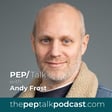
With Clare Williams
This week we have the return of Clare Williams, who contributed three chapters to our book, Have You Ever Wondered? She explains how contemporary questions around race and social justice so quickly point to the gospel when you take the time to wonder about their importance.
Clare Williams is the founder of Real Questions, a platform which explores the intersection of race and faith within the Black British context. She is also a speaker and tutor at The Oxford Centre for Christian Apologetics. Prior to her work in apologetics, she was an English teacher in London secondary schools for ten years. Clare has a degree in English Language and Literature from Oxford University, and Masters in Leadership (2012) and Culture, Diaspora and Ethnicity (2021) from the University of London. She is now a doctoral student conducting research in Sociology at The University of Westminster.



















